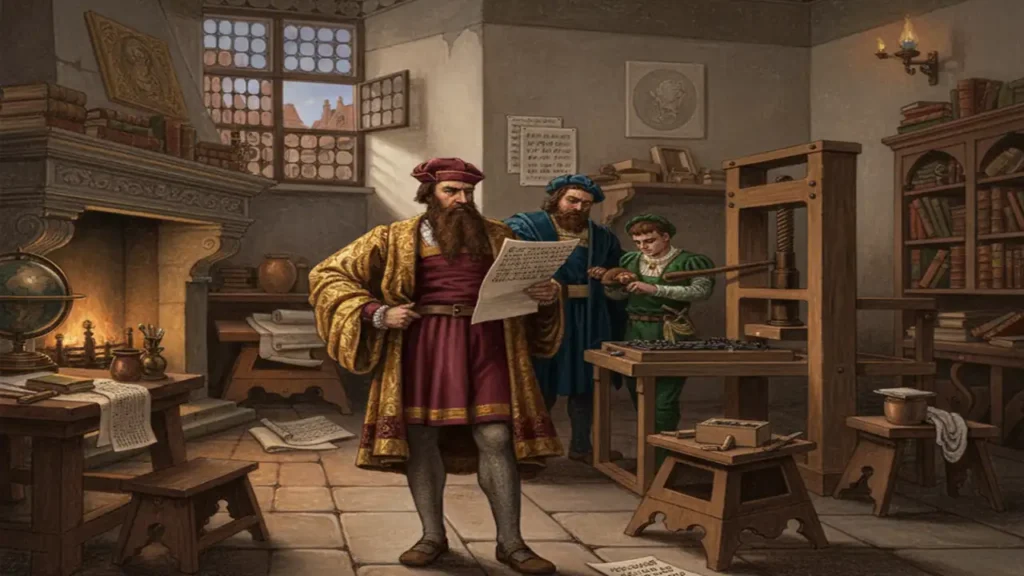
printing press — the quiet engine of modern life. Take it away and the United States tilts into a slower, smaller world where ideas crawl, knowledge costs a fortune, and national debates never quite go national. This isn’t mere nostalgia for ink and paper; it’s a counterfactual that spotlights how deeply the printing press underwrote American literacy, politics, science, and identity.
A nation without mass duplication
Before the printing press, books were hand-copied, error-prone, and rare. Scale solves these problems. The printing press multiplied accurate copies, cut prices, and let ideas travel far beyond local gossip networks. Remove it, and information becomes localized and fragile again—dependent on memory, itinerant lecturers, and letters that may never arrive.
“Imagine if the people of America lived without printing or without printers”
As a thought experiment, that sentence captures the stakes. Without a printing press culture, America would rely on oral exchange and handwritten manuscripts. News would be more rumor than record. Movements would flicker and die in one town before reaching the next. Even basic facts—laws, measurements, spelling—would stay fuzzy because standardization needs stable, widely shared texts.
Education without textbooks
Mass schooling depends on mass texts. The printing press didn’t just make primers cheap; it made them the same everywhere, which allowed standardized curricula, grade levels, and benchmarks. Without it, literacy would skew elite. A few centers might maintain scriptoria, but most communities would teach by recitation and memory. Students would rarely see a library, and teachers would spend precious hours copying rather than teaching. The result: lower literacy, narrower horizons, and a curriculum bound to local custom rather than national standards.
Why writing is significant today
Writing externalizes thought. It lets us review, revise, cite, and scale ideas across time and space. In a digital era, those advantages persist because digital text inherits the virtues of the printing press—stable, shareable, referenceable records. Writing anchors contracts, science, law, and history; it turns fleeting conversation into accountable knowledge. That is why “why is writing significant today” is not merely philosophical—writing is the infrastructure of trust.

Politics without pamphlets
American independence was incubated in print. Pamphlets, broadsides, and newspapers—enabled by the printing press—wove scattered colonies into a debating public. No printing press, no rapid circulation of Common Sense–style arguments, no shared vocabulary of rights, no synchronized outrage. Politics would look like court gossip and town-hall whispers: intense, local, and short-lived. National identity would be thinner because a common conversation would be rarer.
Slower science and smaller expertise
Science advances by replication and critique. Journals, monographs, and manuals—formats born with the printing press—let experiments be inspected and reproduced. Without print, methods would be secrets, not protocols; training would be apprenticeship, not a discipline; discoveries would bottleneck with individual scribes. Innovation would still occur, but diffusion would be slow and uneven, blunting cumulative progress.
Media, memory, and markets
The printing press did more than print books. It created the grammar of mass media: headlines, sections, issues, editions, errata. That grammar taught people how to follow a story over time and how to compare sources. In its absence, markets would be more opaque (fewer posted prices, fewer catalogs), contracts harder to standardize, and consumer protection weaker. Memory would depend on local archives vulnerable to fire, flood, and forgetfulness.
When was the printing press invented?
The movable-type printing press associated with Johannes Gutenberg emerged in the mid-15th century (the 1440s–1450s). That technical stack—movable metal type, oil-based ink, a screw press—dropped the cost of copying by orders of magnitude and unlocked the book as a mass object. America’s later revolutions—political, educational, industrial—stand on that foundation.
Could oral culture compensate?
Oral cultures can be rich and sophisticated; epic poetry and public rhetoric flourish without print. But orality trades reach for resonance. It excels at memory aids (rhythm, formula, performance) but struggles at distributing exact, complex, and cumulative knowledge to millions. The printing press complements speech by giving it storage, searchability (indexes), and comparability (citations). That’s why even podcasts post transcripts.
The counterfactual verdict
Take away the printing press, and America becomes less literate, less integrated, less scientific, and less equal. Education narrows. Politics fragments. Progress slows. The printing press isn’t just a machine; it’s a multiplier that turns solitary insight into social infrastructure. If you want to feel its force, try to imagine building a university, a constitution, or a vaccine rollout without standardized, mass-distributed text—and then realize we rarely have to, because the printing press made imagining together possible.

